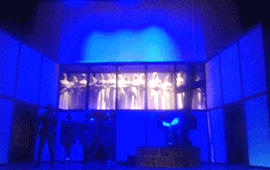> [Archived] Chronicles

Verdi's Troubadour at the Brașov Opera House
The festival started on Saturday, 26th October, with the premiere of Puccini's trypthic, consisting of operas in one act - The Cloak, Sister Angelica and Gianni Schicchi. The performers were artists from Brașov, conducted by Ciprian Teodorașcu, from Bucharest. Then there followed an International Opera and Ballet Ceremony, including the Cinderella ballet, brought to the festival by the ‘Oleg Danovski’ National Opera and Ballet Theatre of Constanta , an evening with operette and musical, with guests from Cluj and Bucharest, and an important and major premiere of Verdi's “Troubadour”, with three performances and three different casts.
I myself had the pleasure to participate in the second performance, on Saturday, 24th November.
For the director Anda Tăbăcaru Hogea, this collaboration with the Brașov Opera House is not the first one. In 1992, she staged My Fair Lady here, which is still successfully performed even today. In 2012, she also staged here the operette Silvia by Kalaman, and Madame Butterfly by Puccini, two difficult performances, two successes. Then this Troubadour by Verdi followed, for whose realization the director continued her path started in 2005, with Simon Boccanegra and carried it on in 2012 with Oedipe, at the Bucharest National Opera. On the whole, she gives up the traditional background and goes for special video effects - daring lightning flashes, projections, film fragments, etc. This way, the staging becomes more animated, rhythmical…full of surprises and manages to easily capture and maintain the audience’s attention. Given the reduced dimensions of the stage, the director, assisted by the stage designer (Rodica Garștea), searches and finds efficient solutions for obtaining extra vertical space for the performance. This way, the performance becomes original and imposing. (scenic movement - Nermina Damian, combat instructor - Bogdan Bălășcău).
Manrico is a role which many tenors both desire and fear. Hector Lopez (Mexico) interpreted it, confidently, brilliantly, involved and profoundly. The experience he gathered in The Troubadour on the stage of the Cluj-Napoca Romanian Opera helped him a lot in performing it.
Soprano Anda Pop made her debut in the role of Leonora, one of the most beautiful but also one of the most difficult roles among Verdi's compositions. A highly beautiful timbre, a good vocal technique which intelligently and constantly serves for expressivity, a fine play, but especially an attentive and efficient dosage of the effort, permitted Anda Pop to successfully accomplish a harshly-constructed score, into a continues crescendo, from the first note up to the last one.
Only good words about Azucena, as well, played by Carmen Topciu; without the usual throaty voice, without demonstratively forcing the chest register, the mezzo-soprano sang following the romantic tradition, full of melody, intense experiences and mystery. Baritone Lucian Petrean, from the Cluj Romanian Opera, chose the same path: a beautiful voice and a pleasant stage presence. When the hesitance specific to the debut will pass, Lucian Petrean will certainly be a very good Conte de Luna that we will always listen to with pleasure.
Unfortunately, the guest from Timișoara, Octavian Vlaicu (Ferrando) was not in his best vocal mood this evening. The distribution beautifully completed with Maria Petcu- Catrina (Ines) and Claudiu Bugnar (Ruiz).
I would like to especially appreciate the performance of the Choir of the Brașov Opera House, and to congratulate the choir master, Ciprian Țuțu.
There's been ten years since conductor Traian Ichim from Chișinău has become a member of the Brașov music staff in; a sufficient period for a perfect integration. His baton is confident, his vision upon the Verdian score is precise and his collaboration with the stage is a good one. Under his musical leadership, the orchestra sounded clearly, expressively accomplishing the musical whole of the masterpiece.
I conclude that The Troubadour, the most recently premier of the Brașov Opera House represents a real success, being a proof of the quality, commitment and ambition of an ensemble which, based on a sexagenarian past, prepares an equally successful future.
Translated by Aida Birghilă and Elena Daniela Radu
MTTLC, The University of Bucharest














